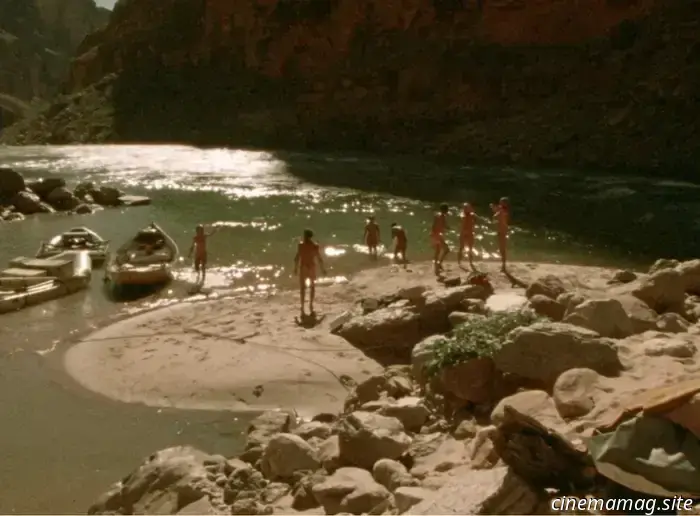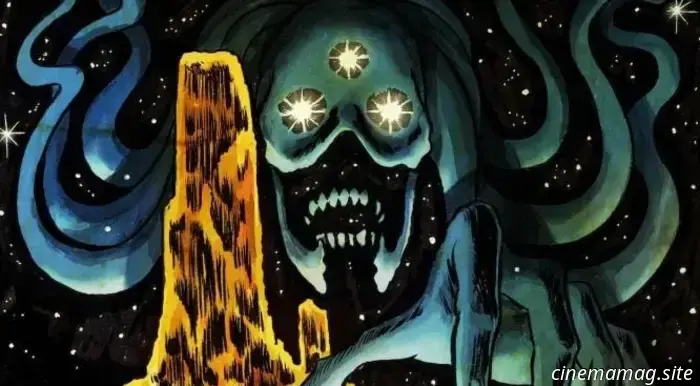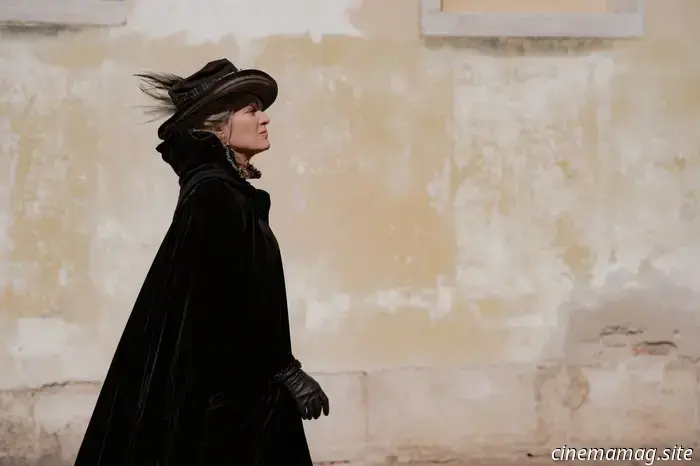
Telluride Review: The River's Curve Longs for the Past and What Might Never Return
The Bend in the River, the third part of director Robb Moss’ ongoing exploration of his friends’ lives (following The Same River Twice in 2003 and Riverdogs in the late ’70s), is a tender and impactful documentary that often feels like a reflection. It is deeply personal and revealing, yet accomplishes this with understated simplicity. To echo the brilliant tagline from the iconic 1968 film The Swimmer: When you view The Bend in the River, will you reflect on your own life? Over four decades ago, Moss documented a weeks-long river journey with a small group of young counterculture individuals, capturing their connections. More than twenty years later, he revisited five of those friends (Danny Silver, Jim Tickenor, Cathy Shaw, Jeff Golden, and Barry Wasserman) as they entered middle age. Jim remained committed to a nontraditional lifestyle but faced financial difficulties; Jeff and Cathy had experienced marriage and divorce between Riverdogs and The Same River Twice; Barry adapted to a suburban family life but was shaken by a cancer scare that he survived; and Danny was managing in New Mexico, though in a job she disliked.
Now two additional decades have passed, and they have all aged. At one point, while cooking in his kitchen, Jeff asks Moss: “Didn’t we have a scene kind of like this twenty years ago?” The response is: yes, but also no. Their motivations have shifted. There is a poignant moment when Danny reflects on all the people who once inhabited her home (husband, children, pets) who are now gone: “It was a full house… and now it’s just me.” Jim appears worse for wear, and his unfinished home serves as a clear, striking metaphor for the latter part of Bend in the River. All five have become quieter and a bit slower, as is natural. However, when Moss and editor Jeff Malmberg juxtapose these contemporary images with scenes from the earlier films, the fragility of time becomes starkly evident.
“We were 28, and now we’re 70,” one of them remarks later in the film. Even the river they are navigating with their young guide is diminished. Climate change has impacted the once-burbling waters. Danny suggests that their legacy should be more than “Bill Clinton and salad bars.” Perhaps so, perhaps not.
The Bend in the River quietly draws you in. It initially feels modest and unassuming until it reveals something profoundly moving. The deliberate contrast between the carefree twenty-somethings, the stressed forty-somethings, and the resigned yet resilient seventy-somethings hits hard. There remains hope, but how much of it?
Moss has a deep affection for these individuals––his camera conveys this clearly. There are unexpected successes and poignant failures that hint at possible futures. Most touching are the moments of the friends journeying down the river while singing. We see them singing in their youth, with the world before them and endless possibilities. Now their songs carry a sense of nostalgia, reminding them of a life well-lived, but perhaps not much more.
The Bend in the River debuted at the 2025 Telluride Film Festival.
Other articles
 Absolute Batman #12 - Preview of the Comic Book
Next week, DC Comics is launching Absolute Batman #12, and you can check out a sneak preview of the issue in the official preview below… BANE LAUNCHES AN ASSAULT! Batman finds himself at the mercy of the formidable Bane. Although his body is in a weakened state, his mind and spirit remain resilient. But how much […]
Absolute Batman #12 - Preview of the Comic Book
Next week, DC Comics is launching Absolute Batman #12, and you can check out a sneak preview of the issue in the official preview below… BANE LAUNCHES AN ASSAULT! Batman finds himself at the mercy of the formidable Bane. Although his body is in a weakened state, his mind and spirit remain resilient. But how much […]
 Star Wars: Tales from the Nightlands #1 - Comic Book Preview
Next week, Dark Horse Comics and writer Cavan Scott will revisit the galaxy far, far away with the debut of the horror-themed limited series Star Wars: Tales from the Nightlands, consisting of three issues. You can check out a sneak peek of the first issue below with the official preview… On Ryloth, Twi’leks murmur about the Nightlands, the […]
Star Wars: Tales from the Nightlands #1 - Comic Book Preview
Next week, Dark Horse Comics and writer Cavan Scott will revisit the galaxy far, far away with the debut of the horror-themed limited series Star Wars: Tales from the Nightlands, consisting of three issues. You can check out a sneak peek of the first issue below with the official preview… On Ryloth, Twi’leks murmur about the Nightlands, the […]
-Movie-Review.jpg) The Long Walk (2025) - Film Review
The Long Walk, 2025. Directed by Francis Lawrence. Featuring Cooper Hoffman, David Jonsson, Garrett Wareing, Tut Nyuot, Charlie Plummer, Ben Wang, Roman Griffin Davis, Jordan Gonzalez, Josh Hamilton, Judy Greer, Mark Hamill, Joshua Odjick, Keenan Lehmann, Marina Stephenson Kerr, Noah de Mel, Teagan Stark, and Daymon Wrightly. SYNOPSIS: A group of adolescent boys vie in […]
The Long Walk (2025) - Film Review
The Long Walk, 2025. Directed by Francis Lawrence. Featuring Cooper Hoffman, David Jonsson, Garrett Wareing, Tut Nyuot, Charlie Plummer, Ben Wang, Roman Griffin Davis, Jordan Gonzalez, Josh Hamilton, Judy Greer, Mark Hamill, Joshua Odjick, Keenan Lehmann, Marina Stephenson Kerr, Noah de Mel, Teagan Stark, and Daymon Wrightly. SYNOPSIS: A group of adolescent boys vie in […]
 Tokyo Underground Killer, a katana slasher game, is now available on Steam.
Developer Phoenix Game Productions has revealed the launch of their neon-lit first-person katana slasher, Tokyo Underground Killer, now available on Steam. Immerse yourself in a rich narrative and confront enemies and bosses in thrilling katana combat across various locations in Tokyo. Check out the new trailer below... Tokyo Underground Killer is a fast-paced, first-person cyberpunk action game that features […]
Tokyo Underground Killer, a katana slasher game, is now available on Steam.
Developer Phoenix Game Productions has revealed the launch of their neon-lit first-person katana slasher, Tokyo Underground Killer, now available on Steam. Immerse yourself in a rich narrative and confront enemies and bosses in thrilling katana combat across various locations in Tokyo. Check out the new trailer below... Tokyo Underground Killer is a fast-paced, first-person cyberpunk action game that features […]
 Venice Review: Pietro Marcello's Duse Offers a Simple Homage to a Legendary Prima Donna
In 1921, three years after the conclusion of WWI, a train left the small town of Aquileia in northeastern Italy. Adorned with flags and wreaths, it transported the coffin of an unknown soldier to his final resting place in Rome. The journey was slow and solemn. As it progressed, crowds assembled to honor his memory—everyday people
Venice Review: Pietro Marcello's Duse Offers a Simple Homage to a Legendary Prima Donna
In 1921, three years after the conclusion of WWI, a train left the small town of Aquileia in northeastern Italy. Adorned with flags and wreaths, it transported the coffin of an unknown soldier to his final resting place in Rome. The journey was slow and solemn. As it progressed, crowds assembled to honor his memory—everyday people
-Movie-Review.jpg) The Cut (2024) - Film Review
The Cut, 2024. Directed by Sean Ellis. Featuring Orlando Bloom, Catriona Balfe, John Turturro, Clair Dunne, and Gary Beadle. SYNOPSIS: A former boxer gets an opportunity for a championship match, but he must first meet the weight limit. The pressure of preparing for a significant bout adds an additional layer of intensity in this nerve […]
The Cut (2024) - Film Review
The Cut, 2024. Directed by Sean Ellis. Featuring Orlando Bloom, Catriona Balfe, John Turturro, Clair Dunne, and Gary Beadle. SYNOPSIS: A former boxer gets an opportunity for a championship match, but he must first meet the weight limit. The pressure of preparing for a significant bout adds an additional layer of intensity in this nerve […]
Telluride Review: The River's Curve Longs for the Past and What Might Never Return
The Bend in the River, the third installment of director Robb Moss' ongoing exploration of his friends' lives (after The Same River Twice in 2003 and Riverdogs in the late '70s), is a poignant and impactful documentary that frequently evokes a sense of self-reflection. It's intimate and enlightening while maintaining a subtle approach.
